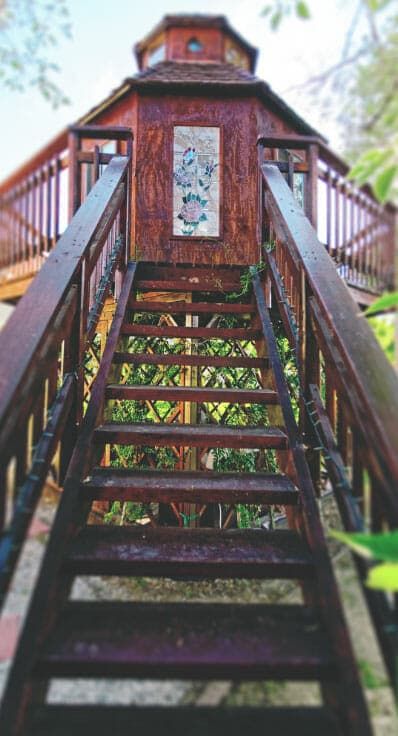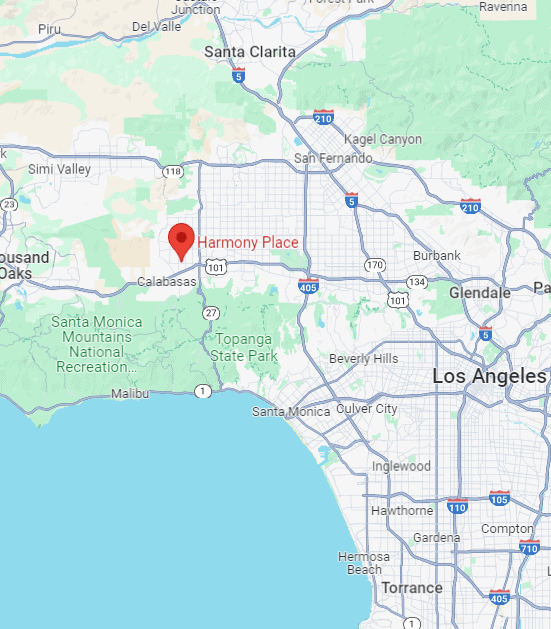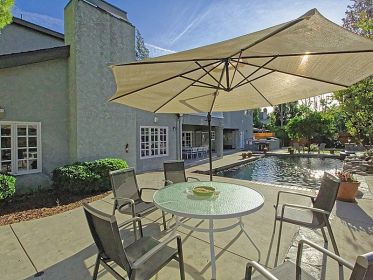Dual Diagnosis Substance and Bipolar Disorder Treatment Centers in Los Angeles, California
At Harmony Place in Woodland Hills, we provide expert care for individuals facing the challenges of dual-diagnosis bipolar disorder and substance addiction. Across our three state-of-the-art rehab facilities in Los Angeles, we offer a full continuum of care, ensuring personalized support at every phase of your recovery. Our approach not only addresses the complexities of bipolar disorder but also works to break the cycle of addiction, offering a foundation for long-term wellness. For those seeking a bipolar treatment center in California , our compassionate team is dedicated to helping you regain balance and control.
We understand that every individual’s needs are unique, which is why we offer a wide range of tailored treatment options. These include individual therapy, group therapy, and evidence-based methods like Cognitive Behavioral Therapy (CBT) for bipolar disorder in Los Angeles. Whether you’re exploring residential treatment centers for bipolar disorder in California or outpatient care, our programs are designed to effectively address the symptoms of bipolar disorder while supporting sobriety. At Harmony Place, we strive to create a supportive and therapeutic environment where healing is both achievable and sustainable.
To make our services more accessible, Harmony Place accepts health insurance plans and provides assistance in determining your coverage for dual-diagnosis treatment. Whether you’re searching for bipolar treatment centers in Southern California or bipolar residential treatment facilities in California, our team is ready to guide you every step of the way. Contact us today to explore your options, learn more about our Los Angeles bipolar disorder programs, and take the first step toward recovery with the resources and care you deserve.
An Overview of Bipolar Disorder And Available Treatment Options in Los Angeles, CA
Over 92% of adults with bipolar disorder are misdiagnosed. This inevitably makes receiving the right treatment to treat your bipolar disorder difficult. That’s why understanding the common signs associated with bipolar disorder can help you better understand if you may be struggling with bipolar disorder and if you may benefit from a bipolar treatment center in Los Angeles.
Many people who have bipolar disorder may also struggle with addiction. Therefore, seeking a Los Angeles bipolar rehab center that treats both addiction and mental illness is critical. At Harmony Place, we offer dual diagnosis treatment in Los Angeles, California, so you can simultaneously work to treat both your addiction and mental illness.
Harmony Place offers premier addiction treatment in Los Angeles, California for anyone, whether you are struggling with addiction or are looking for a dual-diagnosis bipolar treatment center. If you or someone you know is struggling with addiction and in need of treatment, contact us today or call 855-652-9048 to learn more about how we can help you break free of addiction and better manage your bipolar symptoms.
What Is Bipolar Disorder?
Bipolar disorder is a mental illness that causes unusual shifts in mood, energy, concentration, and more that interfere with an individual’s ability to complete normal daily tasks.
Bipolar can be tricky to diagnose because:
- bipolar disorder symptoms resemble other common mental health conditions
- there are different types of bipolar disorder.
There are three types of bipolar: Bipolar I disorder, Bipolar II disorder, and cyclothymic disorder.
Bipolar I Disorder: An individual diagnosed with bipolar I disorder may experience manic episodes that last at least a week or experience severe manic symptoms that warrant the person needing to seek medical attention to help their symptoms. Depressive episodes lasting at least two weeks or longer will also occur.
Bipolar II Disorder: An individual diagnosed with bipolar II disorder will experience both depressive and hypomanic episodes similar to that of an individual with bipolar I disorder. However, the individual’s manic episodes will be less severe.
Cyclothymic Disorder: An individual diagnosed with cyclothymic disorder will experience hypomanic and depressive symptoms like the above two types; however, these symptoms will not last long enough to be considered complete manic or depressive episodes.
What Are the Signs of Bipolar Disorder?
Bipolar disorder can be challenging to diagnose because its signs and symptoms resemble several other mental health conditions like depression and borderline personality disorder.
However, there are key signs of both manic and depressive episodes to look out for, which can further bring to light whether you may be struggling with bipolar disorder.
Common mania and hypomania episode signs include:
- Feeling usually wired, upbeat, or alert
- Increased energy levels
- An exaggerated sense of self-confidence
- Talking more than usual
- Racing thoughts
- Easily distracted and agitated
- Participating in riskier situations/ making poor decisions (i.e., shopping sprees)
It’s important to understand that both mania and hypomania are different types of episodes of bipolar disorder; however, both have the same symptoms. Mania symptoms are more severe than hypomania symptoms and can sometimes be so intense that they require the individual to seek hospitalization.
Meanwhile, the other side of bipolar disorder is the major depressive episodes an individual experiences. Major depressive episodes can get so severe that they can significantly impact an individual’s ability to do normal daily tasks and functions like going to work or school.
Common major depressive episode signs include:
- Depressed mood (i.e., feeling hopeless, sad, empty)
- No longer finding joy and pleasure in activities that you used to enjoy
- Noticeable changes in weight (weight loss or weight gain) accompanied by changes in appetite (increased or decreased appetite)
- Irregular or poor sleep quality (insomnia or sleeping too much)
- Lack of energy or always feeling exhausted
- Inability to concentrate and make decisions promptly
- Thinking, planning, or attempting suicide
Can Bipolar Disorder Cause Substance Abuse?
Bipolar disorder can be challenging to diagnose because its signs and symptoms resemble several other mental health conditions like depression and borderline personality disorder.
However, there are key signs of both manic and depressive episodes to look out for, which can further bring to light whether you may be struggling with bipolar disorder.
Common mania and hypomania episode signs include:
- Feeling usually wired, upbeat, or alert
- Increased energy levels
- An exaggerated sense of self-confidence
- Talking more than usual
- Racing thoughts
- Easily distracted and agitated
- Participating in riskier situations/ making poor decisions (i.e., shopping sprees)
It’s important to understand that both mania and hypomania are different types of episodes of bipolar disorder; however, both have the same symptoms. Mania symptoms are more severe than hypomania symptoms and can sometimes be so intense that they require the individual to seek hospitalization.
Meanwhile, the other side of bipolar disorder is the major depressive episodes an individual experiences. Major depressive episodes can get so severe that they can significantly impact an individual’s ability to do normal daily tasks and functions like going to work or school.
Common major depressive episode signs include:
- Depressed mood (i.e., feeling hopeless, sad, empty)
- No longer finding joy and pleasure in activities that you used to enjoy
- Noticeable changes in weight (weight loss or weight gain) accompanied by changes in appetite (increased or decreased appetite)
- Irregular or poor sleep quality (insomnia or sleeping too much)
- Lack of energy or always feeling exhausted
- Inability to concentrate and make decisions promptly
- Thinking, planning, or attempting suicide
How to Treat Bipolar Disorder
If you struggle with bipolar disorder and addiction, it’s important to treat both conditions at the same time. Otherwise, treating one condition, but not the other can cause the treated condition to come back. For example, if you treat your addiction and quit using but don’t effectively treat your bipolar disorder, this can put you at a greater risk of relapsing.
The first step to treating bipolar disorder is getting a diagnosis. Again, bipolar disorder can often be mistaken for another mental health condition; therefore, an accurate diagnosis is essential so you can get the exact help you need to effectively treat your bipolar disorder. Once you’ve received a proper diagnosis, depending on the type of bipolar disorder you have and the severity of your symptoms can influence your specific treatment plan.
While bipolar disorder cannot be cured, treatment can help better manage your symptoms to lead a healthier, more balanced lifestyle. Common treatment approaches for bipolar disorder include:
Medications
Several medications can be used to treat bipolar disorder. Common medications include mood stabilizers, antipsychotics, antidepressants, and anti-anxiety medications.
Maintenance Treatment
Because bipolar disorder is a lifelong mental health condition, seeking continued/ maintenance treatment is essential to ensure the individual isn’t at an increased risk for relapsing their symptoms.
Day Treatment Programs
Depending on the severity of your symptoms, attending a day treatment program that offers therapy and support can help treat bipolar disorder.
Addiction Treatment
Often, if you struggle with bipolar disorder, you may also struggle with substance abuse. Therefore, seeking treatment for both treating your addiction and bipolar disorder is essential to lead a long-lasting life of sobriety.
What Is Co-Occurring Disorder and Dual Diagnosis Treatment?
Co-occurring disorders, commonly known as dual diagnosis, refers to a cognitive health condition, such as bipolar disorder or manic depression, and a substance addiction, like heroin, cocaine or opioid addiction. Understanding the interplay between bipolar disorder and substance abuse is essential for effective recovery and long-term stability.
Many wonder if drug addiction causes bipolar disorder, but the answer is no, although they are often diagnosed simultaneously. Dual diagnosis treatment in Los Angeles offers care that treats mental health and addiction simultaneously. This integrated approach includes personalized addiction therapy, medication management, and support groups tailored to your needs. By seeking bipolar disorder and substance abuse treatment in Los Angeles, you can access specialized programs designed to help you beat drug addiction while managing manic depression. Effective dual-diagnosis treatment ensures a holistic path to healing and sustained wellness.
What Is Dual Diagnosis Treatment for Bipolar Disorder and Substance Abuse?
Co-occurring treatment addresses both bipolar disorder substance abuse and bipolar illness simultaneously, recognizing that these conditions often interact and worsen each other. If you struggle with alcoholism or drug addiction alongside bipolar disorder, require an approach that targets both at the same time.
At Harmony Place, we are eager to provide compassionate, integrated care for you or a loved one navigating bipolar disorder and substance abuse. Our specialized programs address both alcoholism and mental health challenges through therapy, expert medication management, and comprehensive support services. If you or a loved one are searching for a dual diagnosis bipolar treatment center in California, reach out to us at Harmony Place today.
Statistics on Bipolar Disorder and Substance Addiction in Los Angeles County
In Los Angeles County, bipolar disorder and substance addiction cross over each other, creating harsh challenges. Many individuals with bipolar spectrum conditions also struggle with substance use disorders, highlighting the need for integrated treatment solutions. Substance abuse, including alcohol and opioids, continues to pose severe health and social issues within the community.
The prevalence of bipolar disorder in Los Angeles County highlights the risk of developing substance dependence, complicating both diagnosis and treatment. This co-occurrence necessitates specialized addiction counseling and substance abuse therapy to address the dual challenges effectively. Support systems and relapse prevention strategies are essential in helping individuals manage their mental health condition while overcoming addiction, ensuring a path toward lasting wellness and stability.
What Are the City of Angels’ Favorite Attractions?
Los Angeles, known as the City of Angels, boasts a diverse collection of attractions that cater to all interests. Wander through the glamorous streets of Beverly Hills, explore the vibrant beaches of Santa Monica, or enjoy the cultural charm of Pasadena and Long Beach.
For breathtaking views and unique experiences, visit the Griffith Observatory to gaze at the cosmos and the iconic Hollywood Sign. The Santa Monica Pier offers classic seaside entertainment with its amusement park and eateries, perfect for a fun day out. Meanwhile, Universal Studios Hollywood provides thrilling rides and an insider’s look at movie magic. Whether you’re a resident or a tourist, Los Angeles’ favorite attractions ensure an unforgettable experience in the heart of Southern California.

We Will Check Your Insurance
Inpatient Bipolar Disorder and Addiction Treatment
Managing bipolar disorder and addiction together requires specialized care, and inpatient treatment at Harmony Place in Woodland Hills, CA, is designed to meet this unique challenge. When these two disorders occur simultaneously, also known as dual diagnosis, they can intensify each other, making recovery without integrated treatment especially difficult. Harmony Place offers a supportive and structured environment where individuals can focus entirely on their health and healing. Through personalized care plans, evidence-based therapies, and round-the-clock support, the program addresses the complex relationship between mental health and substance use. By stabilizing mood fluctuations and tackling the triggers behind addiction, inpatient care forms a solid foundation for long-term recovery.
At Harmony Place, the inpatient programs provide comprehensive dual-diagnosis treatment that includes both bipolar disorder and alcohol or drug addiction rehabilitation. For those struggling with alcohol addiction, inpatient options include detox support, therapeutic interventions, and tools to manage the emotional ups and downs that come with bipolar disorder. Likewise, individuals battling drug addiction receive medical, psychological, and emotional support to break the cycle of substance use while stabilizing mood. The serene atmosphere in Woodland Hills offers a perfect balance of peace and accessibility within Los Angeles, creating an environment where individuals can rediscover hope and commit fully to a brighter future.
Outpatient Bipolar Disorder and Addiction Treatment
Outpatient treatment for bipolar disorder and addiction provides a flexible yet effective option for individuals managing dual diagnosis. At Harmony Place in Woodland Hills, CA, outpatient programs are tailored to support clients who need structured care without leaving their everyday responsibilities behind. The treatment focuses on helping individuals stabilize mood swings associated with bipolar disorder while also addressing alcohol or drug addiction. This unique approach integrates mental health and substance use care into personalized therapy sessions, offering tools to create balance and resilience. Clients work closely with clinicians to identify triggers, manage cravings, and develop long-term strategies to maintain stability in both their mental health and recovery.
The outpatient program at Harmony Place stands out for its ability to cater to the dual challenges of bipolar disorder and addiction. For those battling alcohol addiction, services include targeted therapy to address mood instability and reduce reliance on alcohol as a coping mechanism. Similarly, individuals recovering from drug addiction receive specialized outpatient care designed to address the interplay between mood fluctuations and substance use. Located in the heart of Woodland Hills, Harmony Place combines convenience and serenity, ensuring clients can access top-quality treatment while remaining connected to the vibrant Los Angeles community. This flexible program enables clients to reclaim their lives, empowering them to progress at a pace that aligns with their unique recovery needs.
Can Drug or Alcohol Addiction Cause Bipolar Disorder?
Bipolar disorder and addiction often coexist, creating a complex interplay between mood disorders and substance use disorder. While substance abuse does not directly cause bipolar disorder, the utilization of drugs or alcohol can exacerbate or trigger mood swings if you are predisposed to affective disorders.
At Harmony Place, we understand the challenges of dual diagnosis. If you are asking yourself, “Can addiction cause bipolar disorder?” we are here to answer your questions. Our comprehensive addiction recovery treatments are designed to treat both bipolar disorder and addiction, providing integrated care that starts with the root causes of both conditions. By addressing mood disorders alongside substance use, we help you achieve lasting wellness and stability. Contact us to begin your journey toward a healthier, balanced life.
Will Bipolar Disorder Lead to Drug or Alcohol Addiction?
Living with a bipolar spectrum condition can increase your risk of developing addiction and bipolar disorder. You might turn to drugs or alcohol to cope with intense mood swings, making substance abuse and bipolar disorder intertwined challenges. Understanding this connection is crucial for effective recovery and managing both conditions simultaneously.
At Harmony Place, you receive specialized substance abuse treatment tailored to address addiction and bipolar disorder together. Our comprehensive programs are designed to support you in overcoming substance use while managing your bipolar spectrum condition. Take the first step toward healing by contacting Harmony Place today and embark on a path to lasting wellness.
What Are Signs and Symptoms of Developing a Substance Abuse and Bipolar Disorder?
Experiencing extreme mood swings is a key indicator of a bipolar condition. These episodes can alternate with phases of deep depression, marked by feelings of hopelessness, fatigue, and loss of interest in activities. Understanding these patterns is crucial for managing a bipolar spectrum condition effectively. Read on to learn more.
Common Signs and Symptoms of Bipolar Disorder
Knowing these signs and symptoms is essential for seeking timely and effective treatment. If you or someone you know is struggling with bipolar mood disorder and substance use disorder, reaching out to a professional treatment admissions center like Harmony Place to learn about their admissions process.
- Extreme Mood Swings: Experiencing intense highs and lows is a hallmark of Bipolar Mood Disorder. These dramatic shifts in mood can disrupt your daily life, affecting relationships and work performance.
- Increased Energy and Activity Levels: During manic phases, you may feel overwhelming energy and engage in multiple activities simultaneously. This heightened state is a key feature of bipolar spectrum disorder, sometimes referred to as a mood swings condition, and can lead to burnout if not appropriately managed.
- Impulsive Behavior: Impulsiveness, such as making hasty decisions or taking unnecessary risks, is typical in bipolar affective disorder. This behavior can escalate into substance use disorder to cope with emotional instability.
- Depressive Episodes: Periods of deep sadness, hopelessness, and loss of interest in previously enjoyed activities indicate depressive episodes in bipolar Syndrome or mania-depression disorder. These phases can severely impact your motivation and overall quality of life.
- Changes in Sleep Patterns: Significant alterations in sleep, whether insomnia or excessive sleeping, are frequent symptoms of bipolar psychiatric condition. Disrupted sleep can exacerbate both mood swings and the risk of starting a substance use disorder.
- Irritability and Agitation: Feeling unusually irritable or agitated, especially during mood swings, is another sign of bipolar mood swing disorder. This heightened irritability can strain personal and professional relationships, further complicating recovery efforts.
- Substance Use Disorder: Turning to drugs or alcohol to manage the emotional turmoil of a bipolar mental health condition can lead to a substance use disorder. Addressing both conditions simultaneously is crucial for effective treatment and long-term recovery.
Common Signs and Symptoms of Drug and Alcohol Addiction
Recognizing these signs and symptoms is imperative for seeking timely help. If you or someone you are close to is struggling with drug or alcohol addiction, contacting a professional drug rehabilitation center like Harmony Place Rehab Center can provide the support needed for detoxification and long-term recovery from substance dependence, alcohol abuse, and opioid addiction.
- Cravings for the Substance: You may experience intense urges to use drugs or alcohol, making it difficult to complete daily tasks or responsibilities. These cravings can dominate your thoughts and lead to relapse even after periods of sobriety.
- Tolerance (Needing More to Achieve the Same Effect): Over time, you might need more and more amounts of a substance to feel the same effects. This tolerance can lead to higher consumption, escalating the risk of addiction and physical health issues.
- Withdrawal Symptoms: When you limit or stop using a substance, you may suffer from withdrawal symptoms during detoxification, such as anxiety, sweating, shaking, or nausea. These uncomfortable symptoms often drive continued use to avoid the discomfort of withdrawal.
- Neglecting Responsibilities: Addiction can cause you to neglect essential responsibilities at work, school, or home. Missing deadlines, failing to meet obligations, or ignoring loved ones are common signs of substance dependence.
- Loss of Control Over Substance Use: You might find it challenging to limit your substance use, even if you intend to cut down or quit. This loss of control is a key factor of addiction and can lead to severe personal and professional consequences.
- Continued Use Despite Negative Consequences: Continuing to partake in drugs or alcohol despite experiencing negative outcomes, such as health problems, legal issues, or relationship conflicts, shows the destructive nature of addiction.
- Social Isolation: You may withdraw from social activities and isolate yourself from friends and family. This isolation can increase feelings of loneliness and depression, making recovery more challenging.
- Risky Behavior: Engaging in risky behaviors, including driving under the influence, unprotected sex, or criminal activities, is a common symptom of addiction. These behaviors increase the risk of harm to yourself and others.
- Physical Health Issues: Chronic substance use can lead to different physical health problems, including liver disease, heart issues, respiratory problems, and infectious diseases. Neglecting your health is a serious sign of addiction.
- Mood Swings: Addiction can cause dangerous mood swings, including irritability, anxiety, and depression. These emotional fluctuations can strain relationships and hinder your ability to seek help.
What Are the Co-Occurring Risks of Drug and Alcohol Addiction and Bipolar Disorder?
When bipolar disorder and drug or alcohol addiction coexist, the interplay between these conditions can significantly heighten the risks and complications involved in recovery. Understanding these co-occurring risks is essential for you to seek out and receive effective treatment and long-term stability.
- Increased Risk of Overdose: Managing a mood instability disorder like bipolar disorder alongside substance abuse heightens the likelihood of overdose. The use of multiple substances to cope with manic-depressive illness can lead to dangerous interactions and increased tolerance, making overdose more probable.
- Worsening Mental Health: Substance abuse can exacerbate symptoms of bipolar disorder, including depression and anxiety. The cycle of addiction can intensify mood swings, making it harder to achieve emotional balance and complicating the management of manic-depressive illness.
- Higher Risk of Suicide: The combination of bipolar disorder and addiction significantly elevates the risk of suicidal thoughts and behaviors. The struggle to manage both conditions simultaneously can lead to feelings of hopelessness and despair, increasing the likelihood of suicide attempts.
- Severe Physical Health Decline: Chronic substance use alongside bipolar disorder can lead to severe physical health issues, such as liver disease, cardiovascular problems, and neurological damage. The added strain on the body from managing a mood instability disorder can accelerate health deterioration.
- Strained Relationships and Social Isolation: Addiction and bipolar disorder can strain relationships with family, friends, and colleagues. Social isolation often results as you withdraw to hide your substance use or due to the unpredictable nature of mood swings, further complicating recovery efforts.
- Impaired Cognitive Function: Both bipolar emotional disorder and substance abuse can impair cognitive functions, including memory, attention, and decision-making. This impairment can hinder the ability to engage effectively in addiction counseling and substance abuse therapy.
- Legal and Financial Problems: The combination of bipolar disorder and addiction can lead to legal issues, such as arrests for substance-related offenses and financial instability due to the cost of substances and potential loss of employment. These problems add additional stress and barriers to recovery.
- Difficulty Maintaining Employment: Managing a dual diagnosis of bipolar disorder and substance abuse makes it challenging to maintain consistent employment. Mood swings and the effects of substances can lead to absenteeism, decreased productivity, and eventual job loss.
- Aggressive or Risky Behavior: Substance abuse can amplify the symptoms of bipolar disorder, leading to aggressive or risky behaviors. This behavior endangers you and those around you, making it crucial to seek comprehensive treatment.
Does Insurance Cover Dual Diagnosis Treatment for Substance Addiction and Bipolar Disorder in LA?
Yes, many health insurance plans in Southern California cover addiction rehab and bipolar disorder treatment. This includes dual diagnosis treatment for bipolar disorder and substance abuse, addressing mood instability disorder, relapse prevention, alcohol medical detox, and inpatient rehab services. Coverage specifics depend on your insurance provider and the plan you have selected.
At Harmony Place, we work with various insurance companies to make our comprehensive treatment accessible to you. Our programs include concurrent treatment for bipolar disorder and substance abuse, ensuring that both conditions are addressed for effective recovery. We offer services such as mood instability disorder, relapse prevention strategies, alcohol detox, and inpatient rehab.
Can Rehab Centers Treat Bipolar Disorder and Substance Addiction at the Same Time?
Yes, dual diagnosis treatment centers exist to help addicts not only recover from substance abuse but also work to effectively treat their mental illness.
If you are an addict who has been diagnosed with bipolar disorder or suspect you may have bipolar disorder, receiving an accurate diagnosis and then seeking help from a dual diagnosis bipolar treatment center is important. The staff at the dual diagnosis bipolar treatment center will help guide you on your road to addiction recovery while also working to simultaneously treat and better manage your bipolar symptoms.
Harmony Place is a leading bipolar treatment center in Los Angeles where addicts can receive tailored treatment to begin their road to recovery.

Concurrent Bipolar Disorder and Substance Abuse Treatment Program in Los Angeles, CA
At Harmony Place, our concurrent treatment program in Los Angeles addresses both bipolar disorder and substance abuse simultaneously, providing a comprehensive approach to your recovery journey. Treating these conditions together ensures a more effective and lasting healing process. Ready to take the next step? Call us today at (855) 652-9048.
Outpatient Addiction Rehab and Bipolar Disorder Treatment Near Me
If you’re searching for outpatient addiction rehab and bipolar disorder treatment “near me,” Valley Restoration Center in Woodland Hills, CA, is the ideal choice. Located at 22900 Ventura Blvd, Ste. 314, our center offers tailored outpatient programs combining evidence-based therapies and compassionate care. We specialize in addressing the unique challenges of managing addiction and bipolar disorder, helping clients work towards a balanced and fulfilling life. Whether you’re dealing with emotional instability or substance dependence, our experienced team creates a personalized plan to meet your needs while empowering you with the tools for long-term recovery.
Valley Restoration Center’s outpatient program focuses on providing flexibility for individuals balancing their recovery with daily responsibilities, such as work, school, or family. By integrating cognitive-behavioral therapy, psychiatric support, and wellness strategies, we aim to stabilize mood swings caused by bipolar disorder while addressing the root causes of addiction. Our center offers support for those recovering from alcohol or drug dependencies through a combination of individual therapy, group sessions, and skill-building techniques. To further ease access to care, we accept many insurance plans, ensuring that financial concerns don’t stand in the way of seeking help. At Valley Restoration Center, we’re committed to making high-quality treatment accessible to everyone in the Woodland Hills and Los Angeles areas.
Conveniently located on Ventura Blvd, Valley Restoration Center is easily accessible for clients across Woodland Hills and neighboring areas like Encino, Calabasas, and Tarzana. Our facility is just minutes away from the Ventura Freeway (US-101), making it a quick drive for those in the San Fernando Valley. For clients using public transportation, local bus routes also serve the area, further enhancing accessibility. Our serene, welcoming location in Woodland Hills is designed to provide a calming space where you can focus on your healing while staying connected to your everyday community. At Valley Restoration Center, you’re always nearby the support you need to take meaningful steps toward a healthier future.
Inpatient Addiction Rehab and Bipolar Disorder Treatment Facility Near Me
For those searching for inpatient addiction rehab and bipolar disorder treatment “near me,” Harmony Place in Woodland Hills, CA, provides a comprehensive and supportive approach to healing. With two tranquil locations—Harmony Place at 23041 Hatteras St. and Harmony Place East at 22913 Burbank Blvd.—our centers are equipped to address the complexities of bipolar disorder alongside addiction. These inpatient programs create a safe and structured environment where individuals can focus completely on stabilizing their mental health and overcoming substance use challenges. By combining professional care with evidence-based therapies, Harmony Place helps clients build lasting foundations for recovery.
Both facilities specialize in dual-diagnosis treatment, offering tailored care for individuals battling mood disorders and addiction. Whether you’re dealing with alcohol dependency or drug addiction, our experienced team provides personalized plans aimed at addressing the root causes of both conditions. Using techniques such as cognitive-behavioral therapy, psychiatric interventions, and holistic wellness activities, we guide clients toward emotional stability and freedom from addiction in a setting that fosters personal growth. At Harmony Place, we understand that each person’s recovery is unique, and we work closely with you to provide the tools and resources needed for long-term wellness. To further ease the process, we accept many insurance plans, making high-quality inpatient care accessible to all.
Harmony Place’s convenient locations make the centers easily reachable for those in Woodland Hills and nearby areas such as Calabasas, Encino, and Tarzana. Both facilities are located near Ventura Blvd., just a short drive from the Ventura Freeway (US-101), simplifying commutes for clients throughout Los Angeles and the San Fernando Valley. For those relying on public transportation, nearby bus routes connect seamlessly, ensuring convenience for all. Nestled in serene settings that balance privacy and accessibility, Harmony Place offers a peaceful refuge for those ready to take meaningful steps toward recovery. If you’re looking for a comprehensive inpatient rehabilitation center near you, Harmony Place is a compassionate, expert partner in your healing.
How Much Does Dual Diagnosis Treatment Cost for Addiction and Bipolar Disorder in Los Angeles, CA?
The cost of dual diagnosis for addiction treatment and bipolar disorder in Los Angeles, CA, varies based on factors such as the type of addiction intervention, substance abuse prevention programs, and the severity of substance misuse and bipolar mental health condition. Treatment duration and the specific services you require also influence the overall cost.
At Harmony Place, we strive to make comprehensive care accessible by offering addiction support groups, personalized therapy, and specialized programs tailored to your bipolar mental health condition. We accept various insurance plans and provide flexible payment options to help manage the expenses associated with substance misuse treatment.
How to Get into a Dual Diagnosis Treatment for Bipolar Disorder and Addiction Rehab
Recognizing that you need help is the first crucial step toward recovery. To get into addiction treatment for bipolar disorder and substance addiction, start by reaching out to a specialized treatment center like Harmony Place. Our experienced team will provide an initial free assessment to understand your needs and formulate a treatment plan focusing on you.
Once you’ve connected with Harmony Place, you’ll find that our center offers concurrent treatment for bipolar disorder and substance addiction, ensuring integrated care for effective recovery. Additionally, Harmony Place provides support services such as addiction support groups and relapse prevention strategies. Contact Harmony Place at (855) 652-9048 to take the first step toward healing.
Los Angeles Dual Diagnosis Rehab Center
Harmony Place in Los Angeles, California provides comprehensive Dual Diagnosis treatment to address addiction and mental health together. Our programs treat depression, anxiety, PTSD, bipolar disorder, ADHD, and trauma using a combination of clinical therapies and holistic recovery approaches. Learn more through the links below.
- Inpatient Rehab Los Angeles
- Intensive Outpatient Program Los Angeles
- Evening Intensive Outpatient Program
- Medication Assisted Treatment Los Angeles
- Outpatient Rehab Program Los Angeles
- Los Angeles Partial Hospitalization Program
- Medically Assisted Detox LA
- Sober Living Homes and Halfway Houses
- Clinical Care Los Angeles
- Family Therapy Rehab Program
- Couples Rehab Los Angeles
- Men’s Addiction Rehab California
- Women’s Rehab Center SoCal
- Addiction Treatment for Veterans
- Short-Term Addiction Rehab
- Long-Term Addiction Rehab
- Private Luxury Rehab Los Angeles
- Faith-Based Rehab Programs
- Non-Faith-Based Rehab
- Rehab for Professionals LA
- Rehab Aftercare Alumni Programs
California Addiction Treatment and Bipolar Disorder Statistics and Information
- Approximately 56% of individuals with bipolar disorder will experience a Substance Use Disorder (SUD) in their lifetime, with alcohol and drug abuse being the most common, according to research in the journal Medicina.
- Individuals with bipolar disorder are also more likely to abuse drugs. For example, about 20% of individuals with bipolar disorder struggle with cannabis dependence, and a similar percentage has issues with cocaine, according to the National Institute of Mental Health.
- Bipolar disorder with co-occurring substance use leads to higher relapse rates. For example, in people with bipolar disorder and alcohol addiction, relapse rates are significantly higher, making long-term recovery more difficult, according to The British Journal of Psychiatry.
- The success of treating co-occurring bipolar disorder and addiction is often complicated by higher relapse rates. Individuals with both conditions are at an increased risk of relapse compared to those with either condition alone. Integrated approaches that treat both conditions concurrently have shown more promising outcomes, but the relapse rates remain challenging, according to Michigan Medicine.
- Studies show that integrated treatment approaches, which address both bipolar disorder and addiction simultaneously, lead to better outcomes. For example, around 50% of individuals with bipolar disorder who receive integrated care for both conditions experience significant improvement in their symptoms over the long term, according to JAMA.










